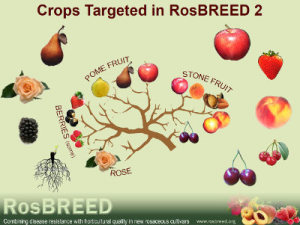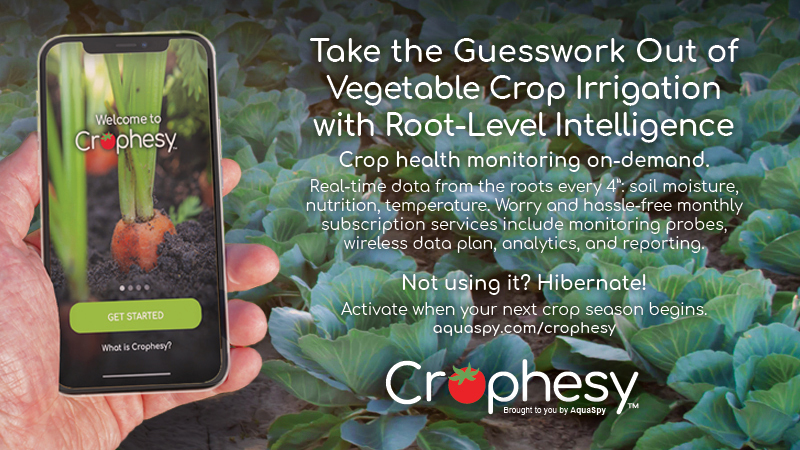RosBREED 2 Program Focuses On Disease Resistance And Quality
 How would you like to be able to eliminate sprays for some of your toughest disease problems, cutting the number from 12 times maybe down to four? Perhaps even fewer? And do it with fruit varieties that also deliver the taste, eating, and storage qualities you and your customers now expect?
How would you like to be able to eliminate sprays for some of your toughest disease problems, cutting the number from 12 times maybe down to four? Perhaps even fewer? And do it with fruit varieties that also deliver the taste, eating, and storage qualities you and your customers now expect?
That’s the goal of the just-launched RosBREED 2, a multi-university, cross-industry program bringing the latest knowledge in genomics to commercial fruit breeding.
I had the opportunity to participate in the group’s 2015 Advisory Panel meeting in January. It was an eye-opening experience to see the potential – and the challenges – involved in trying to develop useful new varieties. Even with some amazing new tools and knowledge available to both scientists and breeders, the process is amazingly complex and resource intensive. A ton of work has been done over the years in developing disease resistant varieties and in developing varieties with great horticultural quality. Getting both of those things together in the same varieties has been somewhat elusive.
What is RosBREED 2?
RosBREED 2 is a new project that’s part of the most recent Farm Bill. Our industry receives $10 million over the next 5 years through an SCRI grant to help develop and implement DNA techniques to speed the efficient, successful delivery of varieties with both disease resistance and desirable fruit quality for growers of rosaceous crops including apples and pears, peaches, sweet and tart cherries, berries, and even roses.
The program is using advanced breeding and DNA techniques – not GMO technology, in case you’re wondering – that will allow breeders to literally cut years and thousands of dollars from the process of creating and evaluating crosses that will potentially lead to valuable new commercial varieties.
I won’t even try to get into the science here, and you probably don’t care all that much about the details anyway. Ultimately, the question the program needs to answer is “What’s in it for you?”
Hopefully, the answer to that question is, “A lot.”
If you’re a cherry grower, do you care about managing Armillaria root rot? How about scab if you’re an Eastern apple grower? These are the targets – among others – that the RosBREED program has in its sights. Targeted crops and diseases include:
- Apples: scab, blue mold, fire blight
- Peach (scion and rootstock): bacterial spot, brown rot, Armillaria root rot
- Pear: fire blight
- Sweet cherry: powdery mildew
- Tart cherry (scion and rootstock): cherry leaf spot, Armillaria root rot
- Strawberry: root and crown rots, bacterial angular leaf spot
- Blackberry: fruit sweetness
- Rose: black spot
“We’re trying to bridge the chasm between genomic research and breeding programs,” says Amy Iezzoni, professor at Michigan State University and RosBREED 2 program co-director.
Traditionally this has not been easy to do.
“We have the disease resistant parent material available; that’s not really a problem. The challenge for breeders is getting that disease resistance into plant material that has the other quality aspects that growers need and consumers want. There really have been no successful disease resistant varieties in use in our industry,” she says.
The goal of the program isn’t just breeding the next club variety that squeezes a little more money out of the growers who grow it. The program is designed to help create new tools that any breeder can use to develop great new varieties in any of the rosaceous crops.
“If we can use RosBREED 2 to speed the development of disease resistant varieties, that’s a great investment that helps everyone,” says Jim McFerson, manager of the Washington Tree Fruit Research Commission, RosBREED 2 industry representative, and American/Western Fruit Grower tree fruit expert.
American/Western Fruit Grower is pleased to be an active participant in RosBREED 2 as a member of the Extension Advisory Panel. We urge you to support this program with your advice – talk to your commodity groups and local breeding programs and make sure they know your priorities. Let your legislators know programs like these are important for the future of your operation.
RosBREED is funded by the federal government and our tax dollars – yours and mine. We can all debate about where and how well a lot of our tax revenues are invested, but this is one case where our industry – and your business – can and hopefully will see a direct benefit in the coming years.










